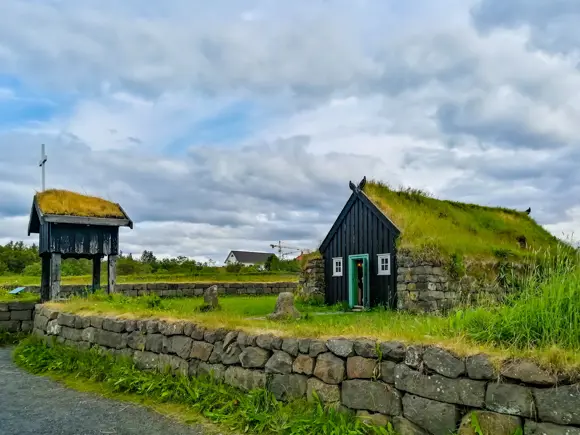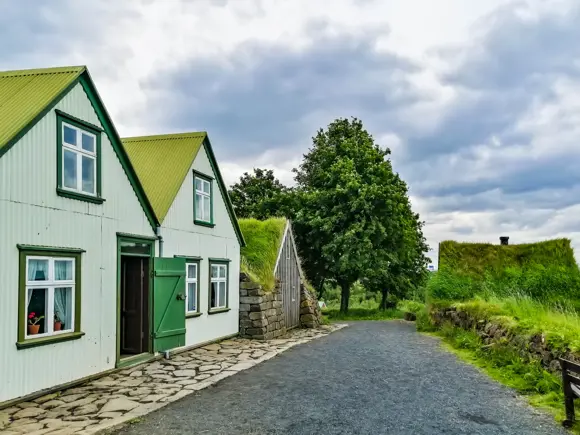Your Guide to Árbæjarsafn Open Air Museum

Iceland has a fascinating history, layered in Viking settlement and lore. But have you ever wondered what Reykjavík was like centuries ago? At Árbæjarsafn, also known as the Árbæjarsafn Open Air Museum, history comes to life before your very eyes in the most vivid and immersive ways. Set on the original site of an authentic and traditional Icelandic farmstead, this hidden gem of a museum serves as a time capsule of the city’s past. Here, you can discover traditional turf houses, guides in traditional costumes, and well-preserved artefacts from a time that no longer exists.
While Árbæjarsafn will certainly appeal to history buffs, it’s also fascinating for curious travellers or families looking for an educational but entertaining day out. This is a unique opportunity to immerse yourself in the deep cultural heritage of Iceland. Here, we’ll look at everything you should know before you visit, from how to get there to insider tips and what to expect during your visit.
What is Árbæjarsafn?
Árbæjarsafn is Reykjavík’s official open-air museum. It offers a fascinating and educational glimpse into how Icelanders from centuries past lived. It’s located on an old farm known as Árbær. The museum was founded in 1957 in an effort to preserve and highlight traditional Icelandic culture, architecture, and everyday life.
Now the site is home to more than 20 historic buildings, which have all been relocated from different areas of the city. This variety of buildings includes a village church, a blacksmith’s forge, turf-roofed houses and even a barracks from WWII. The buildings are all arranged around the site like a small rural settlement, bringing to life the authentic environment from the time periods highlighted.

Where is Árbæjarsafn?
Árbæjarsafn Open Air Museum can be found in the eastern part of Reykjavík, within the suburb of Árbær, which takes its name from the farm. While the museum is only a few miles from the buzzing centre of Reykjavík, visiting this open-air museum feels like more of an escape to the countryside. Getting there is easy, and it’s a fantastic addition to your Reykjavík itinerary.
Address: Kistuhylur 4, 110 Reykjavík, Iceland
Information for Visiting Árbæjarsafn Open Air Museum
When planning your visit to Árbæjarsafn Open Air Museum, it’s helpful to know the fine details so you don’t get caught out unprepared. Here are the basics to help you plan your day at this fantastic historical gem.
Opening Hours & Guided Tours
Árbæjarsafn is open daily from 1 pm - 5 pm. Check before your visit if there are any national holidays, as this could affect opening times. Guided tours occur daily at 1 pm and do not require additional pre-booking. Simply show up in time to join the tour and enjoy!
Admission & Tickets
Entrance to Árbæjarsafn Open Air Museum is free if you opt for a Reykjavík Card, which provides free or discounted entrances to any attractions and swimming pools across the city.
If you choose to purchase a ticket, concessions are available for students, while children under 17 and individuals with disabilities can enter for free. A standard adult ticket costs 2.450 ISK ($17.50 USD/£14.30 GBP).
Seasonal Highlights & Special Events
Árbæjarsafn is open year-round and is always a joy to visit, but at certain times of the year, it truly comes to life. A variety of special seasonal events celebrate authentic Icelandic traditions and community life.
Christmas at Árbæjarsafn: Witness the museum transform into a festive winter village. Take part in traditional Icelandic experiences, like candlelight turf church services, traditional Laufabrauð (deep-fried bread) making, visits from the legendary Yule Lads, and plenty of crafting activities for children to enjoy.
Icelandic National Day – June 17th: Enjoy lively celebrations for Iceland National Day at Árbæjarsafn. Join in traditional Icelandic folk music and dancing, historical reenactments, historical games, drinks and food.
Harvest & Craft Festivals: Throughout summer and early autumn, a number of small craft festivals and heritage events occur. The events are aimed to provide insight into traditional crafts that have been an important part of Iceland’s history, including wool spinning and weaving, blacksmithing and woodworking, and traditional Icelandic cooking.
After a brilliant day of basking in Reykjavík’s rich history, you can enjoy modern amenities at any of our Reykjavík hotels. With close proximity to other attractions and fantastic restaurants, our hotels are a wonderful way to relax between days of exploration in Iceland’s capital.
Want to soak up more of Reykjavík’s culture? Check out the top fascinating museums in Reykjavík.
